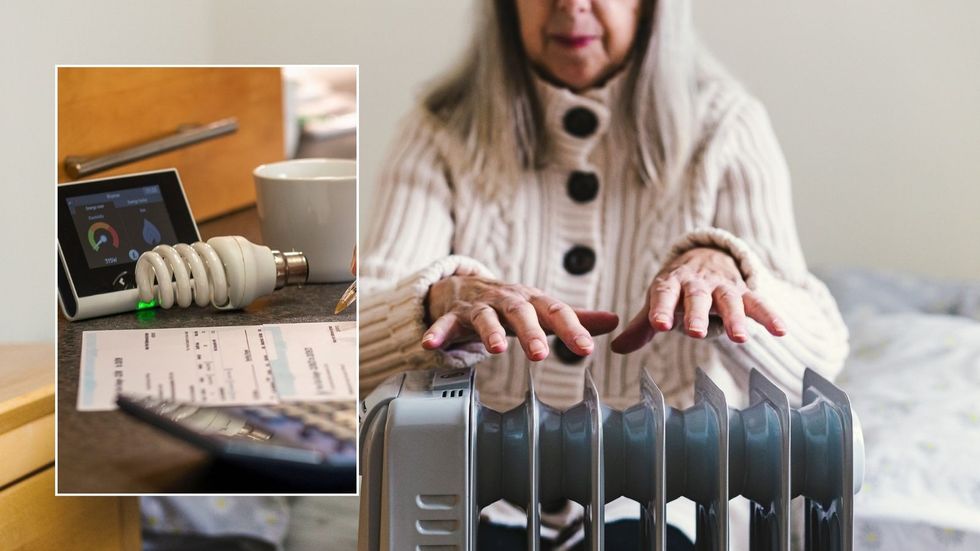'I have to choose between living in a cold damp house or risk being made homeless'

Rising energy bills is placing unprecedented financial stress on women across the country, according to new research
GETTY

Rising energy bills is placing unprecedented financial stress on women across the country, according to new research
A woman is speaking out about being forced to choose between “living in a cold, damp house or risk being made homeless” amid rising debt and energy bill costs.
Sophie from Dorset is among the millions struggling to make ends meet amid the ongoing cost of living crisis.
Having lived in her two-bedroom private rented house for 11 years, she is being forced to contend with soaring costs.
Her Local Authority has assessed her home as a Class 1 Environmental Health and Safety risk for multiple reasons, including rising damp, water ingress, leaking and tripping electrics.
Despite having raised these issues with her landlord six years ago, Sophie claims nothing has been done to address these issues, even after a 50 per cent hike in rent.
She shares the home with her son who has Autism and ADHD with her cost of living woes being compounded by last winter’s increase in energy bills.
Do you have a money story you’d like to share? Get in touch by emailing money@gbnews.uk.
 Energy bills are among a number of outgoings which have soared for many during the cost of living crisis PA
Energy bills are among a number of outgoings which have soared for many during the cost of living crisis PAFurthermore, she has multiple health problems, including Hypermobile Ehlers-Danlos Syndrome, Fibromyalgia and C-PTSD.
Her health conditions are worsened by the cold, damp conditions and her inability to adequately heat her home.
As well as this, Sophie was made redundant on health grounds and currently relies on the benefits system which left her having to choose between paying rent and buying food.
This will be her second winter living in these conditions with her Local Authority preparing to force her landlord to address the issues which make her home nearly inhabitable.
However, she has been advised by her landlord that he will simply sell. “I am left with two choices,” she explained.
“Live in a cold damp house which has none of the legally required landlord safety checks and accept that it will continue to make my health worse or pursue enforcement of the work supported by my council and accept that we may be made homeless as a result.
“I can’t even begin to describe the stress and upset that I feel being unable to provide a safe, warm home for my son.”
While Sophie is a high priority on the housing register, the national social housing shortage and lack of affordable properties in her area make her situation all the more difficult.
The average two-bedroom property rent cost comes to over £1,400 a month, more than double the Local Housing Authority rate.
Sophie’s story is being told following the publication of research commissioned by the Warm This Winter campaign for the Women’s Institute which found that one in 10 women admitted to being in energy debt in the last six months.
LATEST DEVELOPMENTS:

The Women's Institute is outlining the concerning trend of women falling into fuel poverty
GETTYOf these women, 19 per cent suffered sleepless nights due to their money woes with 29 per cent sharing they felt worried about paying their bills.
Melissa Green, chief executive of the National Federation of Women’s Institutes (NFWI), said: “Our research shows that the cost-of-living crisis deeply affects women, who often take on the mental load of running a household on top of their jobs.
“We all know and feel the financial impact, but it’s desperately worrying to see women skipping meals, cutting back on essentials, or borrowing just to make ends meet.”
Sophie added; “As we know, we as women tend to be disadvantaged, the statistics of women in substandard accommodation is shocking.
“It’s also the impacts of poor housing on our children too, they see first-hand the short-term stress and anxiety it causes, which impacts them too.
“Everything from tackling landlords and agents to jumping through the hoops and barriers local authorities place, let alone living in the poor housing itself. Then there’s the long-term implications of it.”
A Department for Energy Security and Net Zero spokesperson said: “We recognise people are struggling with their bills and would encourage anyone in that situation to speak to their supplier.
“We are spending £108billion between 2022 and 2025 supporting households with their bills, have cut National Insurance from 12 per cent to eight per cent for 27 million working people, increased the National Living Wage, worth £1,800 to a full-time worker, and raised benefits by 6.7 per cent
“And all this comes as the energy price cap has fallen to its lowest level in two years, 60 per cent below its peak.”